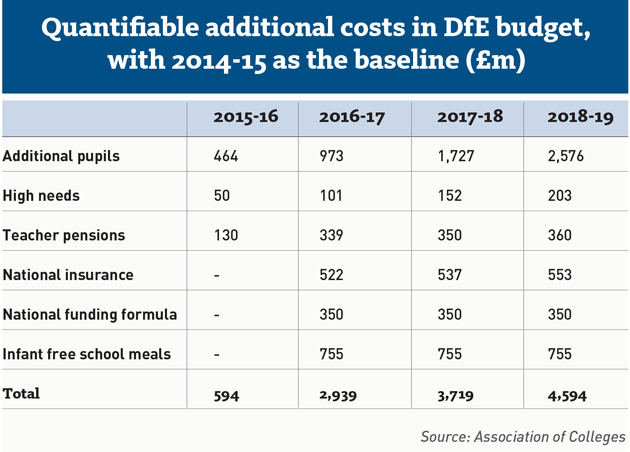The Department for Education (DfE) could face a financial black hole of more than £4bn by 2018/19, the Association of Colleges (AoC) has warned.
In a report by the AoC on the DfE’s financial situation, the body has warned that it could face a budget deficit of £600m in 2015, rising to £4.6bn by 2018/19.
The DfE is responsible for funding the education of 16 to 18-year-olds in general FE and sixth form colleges, and the AoC has raised concerns about the financial viability of the department.
The deficit is associated with an anticipated increase in the number of people of school age, coupled with increased teacher pay and pension contributions as well as costs associated with new policies.
The report also takes into account a planned 17 per cent real terms spending cut across all departments between 2015 and 2019, and the AoC has said the government is yet to announce whether or not the school budget, which has been ringfenced since 2010, will continue to be protected.

Julian Gravatt, AoC assistant chief executive, said: “The estimate we’ve reached is conservative because we’ve not included the fact that the extra pupils will be in more expensive secondary schools rather than primary schools, nor have we estimated the costs associated with closing schools, introducing a new national curriculum or ensuring everyone reaches the required GCSE standard in maths and English by 18.
“If DfE doesn’t tackle this issue early, or systematically, there’s a risk that ministers after the next General Election will make damaging short-term savings which will see further cuts to 16 to 18 funding, which has already borne the brunt of recent education spending cuts.
“We’re calling on the Treasury and DfE to make decisions on education spending on a rational basis, assessing relative need, rather than protecting the budget for 11 to 15-year-olds to the detriment of those aged over 16.”
FE Week is awaiting a response from the DfE.
The report is available to read here. For further analysis and comment, see edition 102 of FE Week, dated Monday, May 12.





